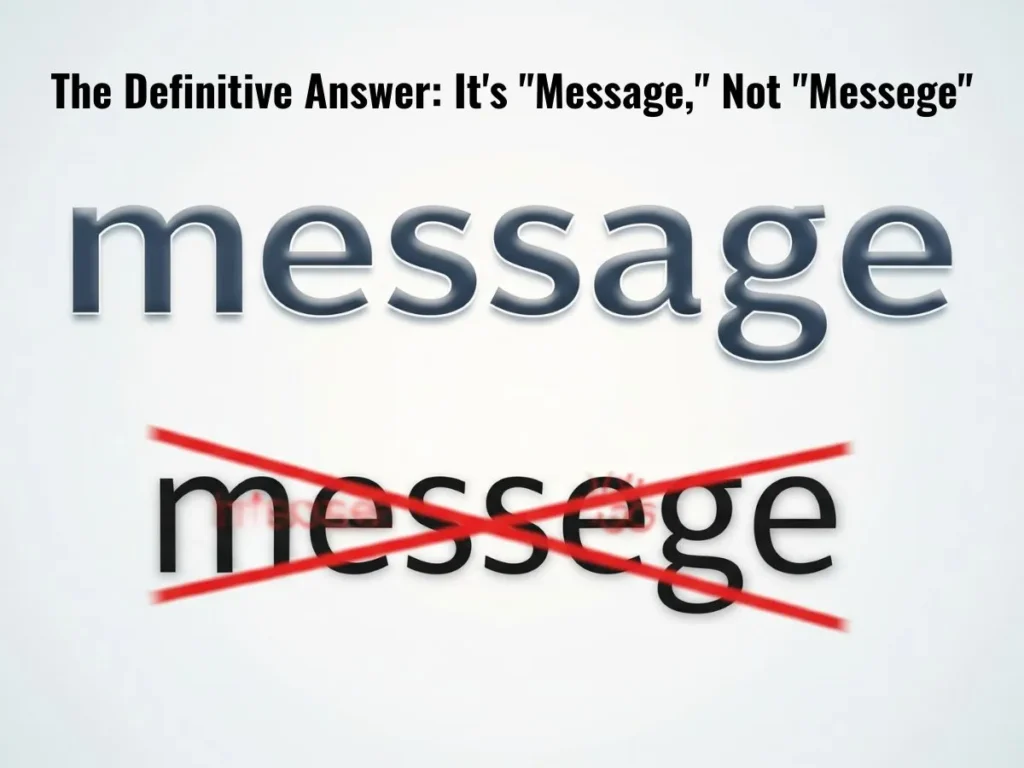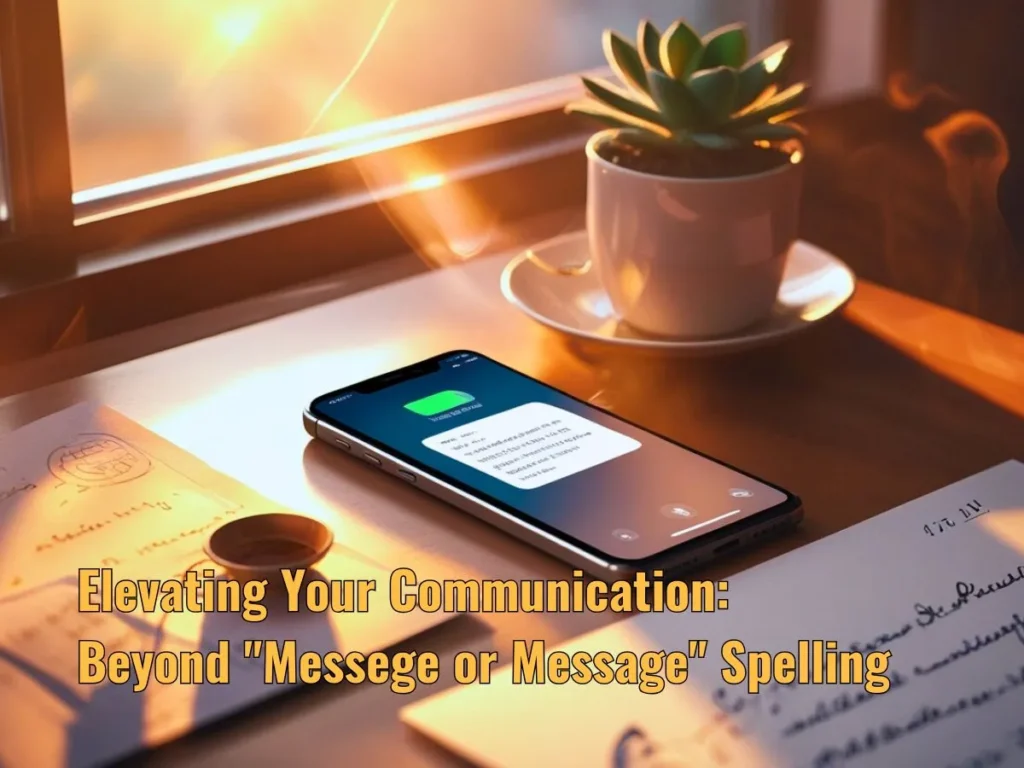1. Introduction
Have you ever stopped typing, the cursor blinking, while you stare at the word trying to decide if you should write messege or message?
It feels silly, but that tiny choice can chip away at how professional and clear your writing looks. Online, where people skim at lightning speed, every letter carries weight.
When you spell things correctly, your readers trust that the rest of your ideas are just as tidy. This short guide clarifies the message versus messege puzzle and offers easy hints for other tricky words, too.
2. The Definitive Answer: It’s “Message,” Not “Messege”

No beating around the bush here: the only real spelling is message. Messege is a phantom; no dictionary accepts it, and it will never score a single point in Scrabble. Of course, that odd combination of letters pops up all the time in half-composed texts because it sounds correct.
The extra e sneaks in after the soft s, even though an a hides out inside the real word and grins every time we miss it. Use message and the worry vanishes.
The story behind the word ‘message’ is quite interesting. It sneaks in from Old French messag and before that from the Latin missus, which is all about the act of sending.
That little etymology sits there like a flashcard reminding you that a message exists to be sent- you don’t pronounce it messegd.
So when someone asks if the messege is legit, the answer is a clear no. Stick with the message if you want your writing to sound sharp and professional.
3. Why the Confusion? Understanding “Messege or Message” Pitfalls
If “message” is so straightforward, why is the messege or message confusion so persistent? A common error (encountered all too frequently even among careful authors) is due to several causes.
Phonetic pronunciation is one big reason. English is well known for its idiosyncrasies in spelling and pronunciation. The ‘a’ in “message” in fact often becomes a soft ‘uh’.
This sound is often mistaken for an ‘e’ by the human ear. This phonological confusion is one of the reasons that the “messege” spelling occurs.
Simple and unintentional typos are also a significant reason. When you’re typing fast, it’s easy for your fingers to slip. This reduces “messege or message”
Spell-checks can help, but they sometimes fail to spot these less overt misspellings. This is particularly true if the incorrect form sounds almost right.
But the “new and come” one is indeed interesting. The other listed one is also interesting because it’s what we know as similar-sounding or competitor confusion, and this entry is the similar-sounding one: “massage.”
Users look specifically for the distinction between messege or massage numerous times. This is clearly in need of clarification. Despite the two words suggesting interaction, their meanings are different:
- Message: This refers to the information or communication that one person or thing sends to another. It’s more about sharing thoughts, news, or instructions.
Example: I’d gotten a message from my boss about the meeting. - Massage: This involves the healing treatment of muscles and tissues using the hands. It is intended to reduce stress, alleviate tension, and, in some cases, for medicinal purposes. It is a physical act.
Example: I’ve booked a massage to loosen my aching shoulder muscles.
4. The Power of “Message”: Meaning, Usage, and Examples
Having dispelled the “messege” myth, we can now wholeheartedly adopt the proper word: “message.” Knowing how to use it helps you see it as a basic form of speech.
Essentially, individuals or tools express a message as content, such as ideas, thoughts, or instructions. A sender sends this material to a receiver.
Mobile messages come in other shapes, too, nuanced by mode and purpose:
- Texts: This most common form can be emails, text messages, letters, and social media posts. You produce a written message when you write something for someone else to read.
- Voice Message: This is an auditory message, like speaking with someone, talking on the phone, or leaving a message on voicemail. What you say is not just words.
- Non-verbal Message: Lifehack Reader Contributed Years Beyond Words. Without using words, can you communicate a message? Through body language, facial expressions, and gestures, nonverbal messages convey and shape perceptions with great power.
Besides, “message” is also a verb. It simply refers to transmitting information under one’s control and without the assistance of a mediating process.
For instance, you might write, “I messaged my friend about plans” or “Please message me the report.” This adaptability underscores its function in everyday interaction.
To give you a clear idea of exactly how these two words can be used, consider these example sentences of “message” within a sentence.
- I received a polite note from the client.
- Please pass on this very important message to the team.
- Her non-verbal message of discomfort was clear.
- The app enables you to message contacts directly.
- The artist’s mural was a heart-rending statement.
- He left a long message on my phone.
- Before you shoot off that all-important message, read it one more time.
5. Elevating Your Communication: Beyond “Messege or Message” Spelling

Learning to tell the difference between messege vs message is an important first step. However, it’s just a piece of a much larger journey toward effective communication.
Spelling correctly is not just a matter of grammar; it affects how your message is perceived and the way you are perceived.
Some of the implications of these examples include the importance of attention to detail in every written exchange you have:
- Professionalism & Credibility: A wrong spelling, such as “messege”, can quickly damage your credibility in any professional place. It implies that you don’t care, which may well erode your authority. Good spelling, on the other hand, demonstrates attention to detail and a focus on quality.
- Clarity & Misunderstanding: The primary purpose of a message is to be understood. Misspellings, grammar, and it all can be confusing. They can even result in total misinterpretation. When the people hearing your message have to work hard to interpret your words, your message can be lost altogether.
- Searchability & Digital Presence: In the digital space, proper spelling is crucial for searchability. Your online content would be seen less in search engines if it misspells a term as “messege,” rather than ”message.”
Here are some more tips for continued communication effectiveness:
- Check for Errors: This is perhaps the most important step. Read your message out loud; doing so can help you spot errors such as misspellings, grammatical mistakes, and punctuation issues.
- Enhance Vocabulary: Every time you read a book, a novel, or a newspaper, new vocabulary and how they are spelled are introduced to you regularly.
- Mnemonics/Memory Aids: Make some weird mnemonics of the words you frequently stumble upon. For “message,” remember that it’s got an “a” in the middle, or that “s” and “a” come before “g.”
6. Real-World Consequences of the “Messege” Misspelling
It might seem trifling for a single misspelling like ”messege,” but in the real world, the ripple effect can be a lot more substantial than any of us can imagine. It’s more than a red underline it can subtly undermine professionalism and credibility.
Take Sarah, the spunky marketing major, who is applying for her dream job. Her cover letter was good, but in the closing paragraph, she said, “I’m looking forward to hearing more about how my skill set can benefit your organization. Please messege me to set up an interview.
That one glaring mistake jumped out. To the hiring manager, flipping through dozens, hundreds, or thousands of applications, it showed her that this candidate didn’t care about even the little things, and so she told Sarah no. The right message was sent, but not the one Sarah had intended.
Like the business owner who emailed all his clients (in Italian) to advise us of an upgrade to their “messaging” platform.
Puzzled responses immediately inundated their inbox, wondering what in the world a “messeging” platform was, or worse, clever people called out the typo.
This small error led to confusion, wasted time, and a somewhat careless impression. It was unprofessional and detrimental to both client trust and the brand’s digital identity.
These are not isolated examples. Whether a missing “a” in an urgent client email, a published social media update, or a key document, such errors can undermine your authority and the effectiveness of your message.
They demonstrate that, yes, in the cutthroat space of digital communication, picture-perfect spellings, especially for a deceptively simple word like “message,” really do make all the difference.
7. Conclusion: Master the “Messege or Message”
In conclusion, the correct spelling for messege or message is very simple, it’s “message. “messege” is just a misspelling, and not an element of standard English at all.
This distinction is crucial. Writing a “message” will enhance the quality of your writing. It also enhances your professionalism and credibility.
By applying practical tips and identifying the mistake, you can communicate more precisely and confidently. Don’t let easily fixed errors undermine your ideas.
Use these writing tips in any correspondence, from short-form messages to reports. Share your other spelling conundrums in the comments; we’ll strive for crystal-clear communication together!
Frequently Asked Questions (FAQs)
What is the correct spelling, “messege or message”?
The right form is ”message.”
Why is “messege” considered incorrect?
“Messege” is a misspelling and is a word that does not exist in the English dictionary.
What is the main difference between “message” and “massage”?
Message or massage: Message is a term for a communication or information; massage is a physical therapy.
Does incorrect spelling impact professionalism?
Yes, misspelling can make you appear less credible and professional in your writing.
What is a simple way to remember the correct spelling of “message”?
Remember, the message has an ” in ” in the middle or s and a comma before g.








